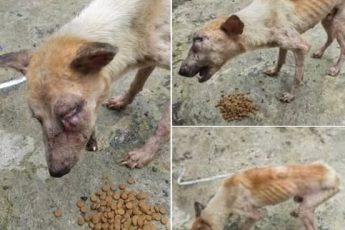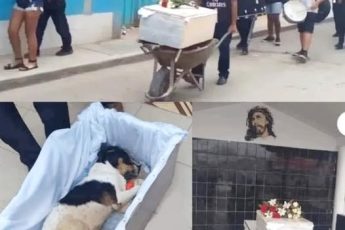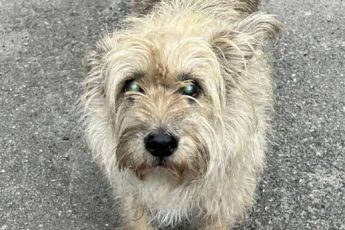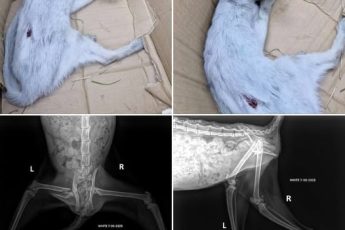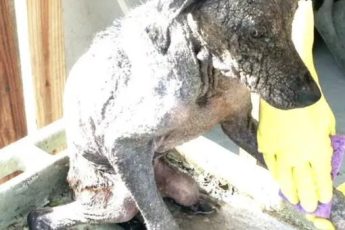In a busy square in the heart of Mexico City, among the hustle, the cars, the loud conversations, and the rushing crowds, there she stands — silent, motionless, wounded… a dog. Not a real one. A statue. Bronze. With her head lowered, forever sitting in waiting. Too thin. Too realistic.
She doesn’t lift her paw, doesn’t wag her tail, doesn’t beg for food. She simply stares. Through you. Into you. Into everyone who passes by.
This is not urban decoration.
This is a reproach.
A whisper of conscience you hear even if you cover your ears.
The monument is simply titled:
“In memory of all stray dogs.”
It was created by artist Hirasol Botello in 2008.
The inspiration for the sculpture was a real dog — Peluso, a street dog with a wounded back and festering eyes, whom no one noticed. He died slowly, in human indifference, in the rain, underfoot, under car horns. And he died. Alone. Without a name. Without a home. Without a funeral.
But now he exists — cast in bronze forever.
So that you stop.
So that you can’t just walk by.
The sculpture is not shiny, not smooth, not “cute.”
It evokes tears.
Silent ones.
In everyone who still has a soul.
You look at the ribs, protruding through the bronze.
At the legs, curled under from exhaustion.
At the eyes — unbearably sad, like those who still hope, but no longer believe.
And you understand: this isn’t just a dog.
It’s a symbol.
A symbol of all those we overlook.
Those we chase from our yards.
Those we call “filthy strays.”
Those who die each winter in basements.
Who eat scraps from dumpsters.
Who fear loud voices, stones, fireworks, children.
Who once believed in humans — and were discarded like broken things.
The statue has a plaque.
On it are the words:
“My only fault was being born on the street — or being abandoned.
All I ask for is a little of your love…”
You read it.
And something inside clicks.
Like a light turning on in a room that had been dark for too long.
Children run by, someone takes a picture, someone laughs.
And someone — suddenly — stops.
Approaches.
Says nothing.
And tears fill their eyes.
Because this is not just a statue.
This is a mirror.
It asks not for applause.
It asks for conscience.
Please:
Don’t walk past a stray dog.
Don’t throw stones.
Don’t frighten them.
Don’t chase them away.
Take a bit of food — leave it gently by the store.
Call your local shelter — maybe they need volunteers.
Spay and neuter your pets — so that more don’t end up homeless.
Support a rescue. Share a post. Teach your children.
Because as long as we’re alive — we still have a chance to become better.
The story of Peluso’s monument is a story of pain — and of hope.
Peluso wasn’t always a stray.
Locals say he once lived in a family.
In a house with a garden.
With a girl named Ana.
They were inseparable — played together, slept side by side, he walked her to school.
But the family was in a car accident.
The parents died.
Ana was taken by relatives to another city.
Peluso stayed.
He waited by the gate.
First a day. Then a week. Then a month.
Neighbors tried to chase him away, but he returned.
He starved.
He grew thin.
He aged.
He became unwanted.
He was a nuisance.
One day someone called animal control.
But they couldn’t find him.
He was hiding.
He no longer believed.
He died in the shadow of an old tree.
Alone.
In 2007.
The next day, someone left flowers there.
Then more followed.
People started telling the story — of the dog who waited for a girl.
Of the dog no one took in.
The dog who was killed by our indifference.
A year later, Hirasol appeared.
She heard the story — and couldn’t stay silent.
She took clay.
Then metal.
Then she found sponsors, volunteers, townspeople who donated what they could.
And she created a statue.
The first in the country not for a hero. Not for a politician. But for a dog.
Since then, on Peluso’s remembrance day, people leave bowls of food by the statue.
They bring their children.
They cry.
And they promise themselves:
I will not walk past.
Because this is not just a dog.
It’s a lesson.
A prayer.
A hope that we are not completely lost.
If you’ve read this far — thank you.
You’re no longer indifferent.
Which means the world still has a chance.
